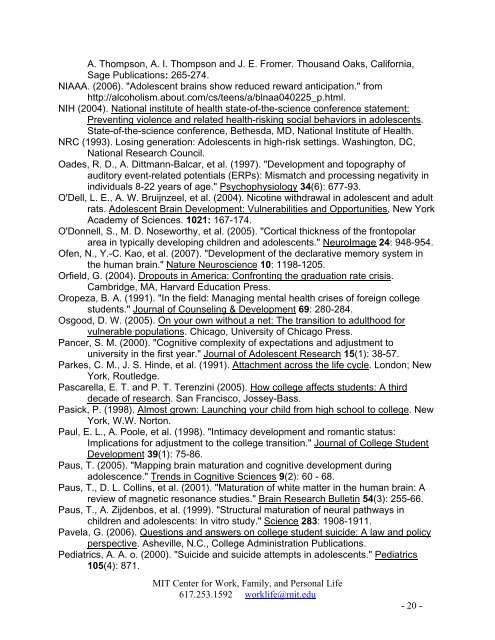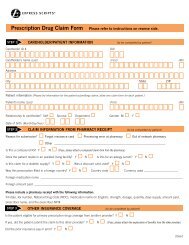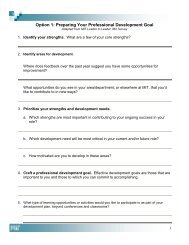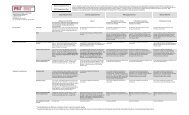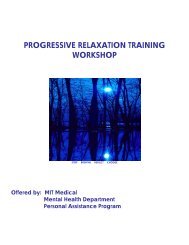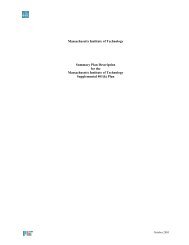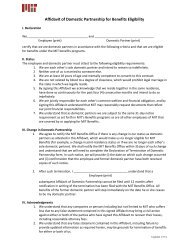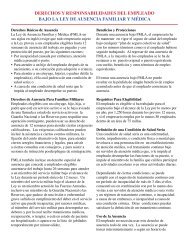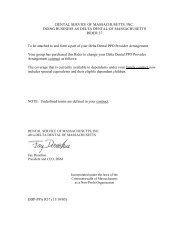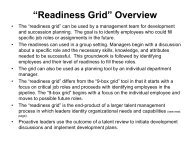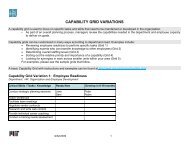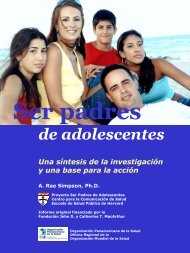MIT Center for Work, Family, and Personal Life 617.253.1592 ...
MIT Center for Work, Family, and Personal Life 617.253.1592 ...
MIT Center for Work, Family, and Personal Life 617.253.1592 ...
Create successful ePaper yourself
Turn your PDF publications into a flip-book with our unique Google optimized e-Paper software.
A. Thompson, A. I. Thompson <strong>and</strong> J. E. Fromer. Thous<strong>and</strong> Oaks, Cali<strong>for</strong>nia,Sage Publications: 265-274.NIAAA. (2006). "Adolescent brains show reduced reward anticipation." fromhttp://alcoholism.about.com/cs/teens/a/blnaa040225_p.html.NIH (2004). National institute of health state-of-the-science conference statement:Preventing violence <strong>and</strong> related health-risking social behaviors in adolescents.State-of-the-science conference, Bethesda, MD, National Institute of Health.NRC (1993). Losing generation: Adolescents in high-risk settings. Washington, DC,National Research Council.Oades, R. D., A. Dittmann-Balcar, et al. (1997). "Development <strong>and</strong> topography ofauditory event-related potentials (ERPs): Mismatch <strong>and</strong> processing negativity inindividuals 8-22 years of age." Psychophysiology 34(6): 677-93.O'Dell, L. E., A. W. Bruijnzeel, et al. (2004). Nicotine withdrawal in adolescent <strong>and</strong> adultrats. Adolescent Brain Development: Vulnerabilities <strong>and</strong> Opportunities, New YorkAcademy of Sciences. 1021: 167-174.O'Donnell, S., M. D. Noseworthy, et al. (2005). "Cortical thickness of the frontopolararea in typically developing children <strong>and</strong> adolescents." NeuroImage 24: 948-954.Ofen, N., Y.-C. Kao, et al. (2007). "Development of the declarative memory system inthe human brain." Nature Neuroscience 10: 1198-1205.Orfield, G. (2004). Dropouts in America: Confronting the graduation rate crisis.Cambridge, MA, Harvard Education Press.Oropeza, B. A. (1991). "In the field: Managing mental health crises of <strong>for</strong>eign collegestudents." Journal of Counseling & Development 69: 280-284.Osgood, D. W. (2005). On your own without a net: The transition to adulthood <strong>for</strong>vulnerable populations. Chicago, University of Chicago Press.Pancer, S. M. (2000). "Cognitive complexity of expectations <strong>and</strong> adjustment touniversity in the first year." Journal of Adolescent Research 15(1): 38-57.Parkes, C. M., J. S. Hinde, et al. (1991). Attachment across the life cycle. London; NewYork, Routledge.Pascarella, E. T. <strong>and</strong> P. T. Terenzini (2005). How college affects students: A thirddecade of research. San Francisco, Jossey-Bass.Pasick, P. (1998). Almost grown: Launching your child from high school to college. NewYork, W.W. Norton.Paul, E. L., A. Poole, et al. (1998). "Intimacy development <strong>and</strong> romantic status:Implications <strong>for</strong> adjustment to the college transition." Journal of College StudentDevelopment 39(1): 75-86.Paus, T. (2005). "Mapping brain maturation <strong>and</strong> cognitive development duringadolescence." Trends in Cognitive Sciences 9(2): 60 - 68.Paus, T., D. L. Collins, et al. (2001). "Maturation of white matter in the human brain: Areview of magnetic resonance studies." Brain Research Bulletin 54(3): 255-66.Paus, T., A. Zijdenbos, et al. (1999). "Structural maturation of neural pathways inchildren <strong>and</strong> adolescents: In vitro study." Science 283: 1908-1911.Pavela, G. (2006). Questions <strong>and</strong> answers on college student suicide: A law <strong>and</strong> policyperspective. Asheville, N.C., College Administration Publications.Pediatrics, A. A. o. (2000). "Suicide <strong>and</strong> suicide attempts in adolescents." Pediatrics105(4): 871.<strong>MIT</strong> <strong>Center</strong> <strong>for</strong> <strong>Work</strong>, <strong>Family</strong>, <strong>and</strong> <strong>Personal</strong> <strong>Life</strong><strong>617.253.1592</strong> worklife@mit.edu- 20 -


